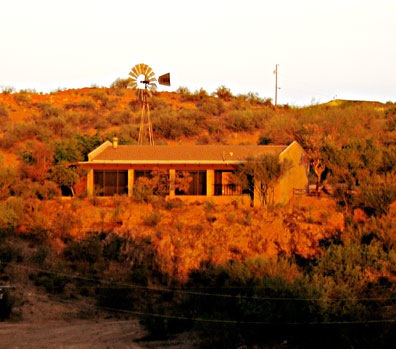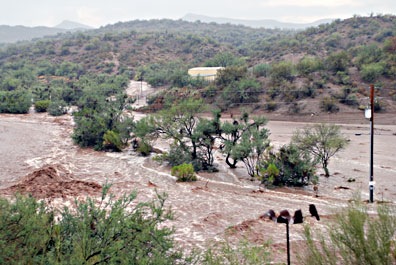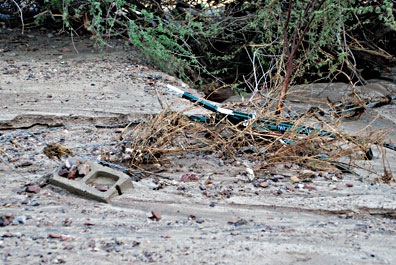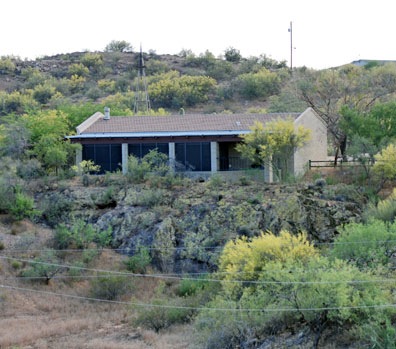Things change.
There were a few things that drew us to our house in Wickenburg back in 1997 — beyond the obvious benefits of living in a recently built home. Situated in a hilly and rocky area on the edge of town, our 2-1/2 acres of horse property ensured plenty of privacy. Indeed, to this day we often sleep with the curtains wide open to the night sky. We had few neighbors and the ones nearby were generally very quiet. The dirt road we shared with two neighboring homes was in such bad shape that we didn’t have to worry about strangers bothering us. The Jehovah’s Witnesses have only found us twice in 11 years.
But one of the best things about our house was the view out the back. I’m not talking about the glimpse of nearby Vulture Peak. I’m talking about my neighbor’s home and its windmill.
 The house was one of the very first built in our area. It’s a one-story structure with just two bedrooms and two baths, perched on a rocky, lichen-covered outcropping. At the base of the rocks was a densely vegetated flood zone, filled with local trees and bushes slightly higher than the level of Cemetery Wash, which also flows through our property. Up at house level were irrigated trees so mature that they blended in perfectly with the home. The house seemed to be part of the landscape. And in the morning, when the first light of day hit it from the east, it glowed red, as shown in this July 2007 photo.
The house was one of the very first built in our area. It’s a one-story structure with just two bedrooms and two baths, perched on a rocky, lichen-covered outcropping. At the base of the rocks was a densely vegetated flood zone, filled with local trees and bushes slightly higher than the level of Cemetery Wash, which also flows through our property. Up at house level were irrigated trees so mature that they blended in perfectly with the home. The house seemed to be part of the landscape. And in the morning, when the first light of day hit it from the east, it glowed red, as shown in this July 2007 photo.
But what I loved most was the windmill. This wasn’t a decorative lawn ornament — it was the real thing. It looked ancient and antique, but it caught the wind faithfully and pumped water from a well. Enough water for my neighbors to have a fish pond. A pond big enough to attract herons — yes herons! — in the desert.
Sometimes on a quiet evening, when the wind blew from the west, I could hear the mechanical clanking sound of the gears and pumps. The rhythm varied with the wind speed. And we could look outside during daylight hours and see just how windy it was.
When we first moved in, I came very close to choosing the back guest room for my office just so I could look out at that windmill while I worked. But late afternoon sun shining in that window convinced me that the front bedroom was a better choice if I wanted to leave my blinds open.
Time went on. And on. My neighbors decided to move. They put the house up on the market and about sixteen months ago, just before the real estate bubble burst, sold it for their asking price. I heard about the new owners through the local grapevine. Wealthy people who had another home. This would be their “guest house,” one person told us. They have horses and kids. They’re going to use it for a vacation home.
Before long, the workers arrived. They enlarged the horse enclosures on the property’s lower level and put in a welded pipe fence to create an arena. I worried when they put up tall poles for lighting and hoped they didn’t plan on keeping them on every night. More workers came with chainsaws and heavy equipment. Over a period of several days, the removed all the natural vegetation below the house, leaving the land barren. They’re putting in an irrigated pasture, one neighbor said. They used earth moving equipment to pile sand in berms that they evidently expected to protect the newly cleared land. They fenced in all of their flood plain property, putting an access gate in the deepest part of the wash.
Then they disappeared.
For a while, there was a red truck in the driveway. A caretaker, someone told me. Lights were on at night. The house looked a bit lived in. But then the red pickup stopped coming. A single light was on all the time, like a blind eye in a forgotten home. Then even that went out.
 Monsoon season came and the first heavy rain brought a massive flash flood. The sand berms were no match for the power of flowing water. The water coming down the wash was no longer held back by the dense vegetation that had grown below the house. The wash changed its course, flooding the undeveloped “pasture” and cutting across the bottom of our access road. The rushing water completely flooded the sandy area in our part of the flood plain and, for the first time ever, our entire fence was washed away.
Monsoon season came and the first heavy rain brought a massive flash flood. The sand berms were no match for the power of flowing water. The water coming down the wash was no longer held back by the dense vegetation that had grown below the house. The wash changed its course, flooding the undeveloped “pasture” and cutting across the bottom of our access road. The rushing water completely flooded the sandy area in our part of the flood plain and, for the first time ever, our entire fence was washed away.
 When the water subsided, parts of our neighbor’s new fence were tangled across the access road to our neighbor’s house. Cinderblocks from their corral area littered our lower horse corral. Their “pasture” was filled with sand. Lucky they hadn’t set up the irrigation yet; it would have been destroyed.
When the water subsided, parts of our neighbor’s new fence were tangled across the access road to our neighbor’s house. Cinderblocks from their corral area littered our lower horse corral. Their “pasture” was filled with sand. Lucky they hadn’t set up the irrigation yet; it would have been destroyed.
No one came to fix their fence. My neighbor dragged its remains aside so he could drive through. After a while, tired of chasing trespassers in quads out of the wash, he spent a whole day repairing the damage.
Still no one came.
Throughout this time, the windmill kept turning. But the fish pond was empty and the riparian wildlife was gone. The irrigation must have been turned off because trees close to the house began to die. It made no sense; the water was free. Why not take care of the trees that depended on it?
This winter, I noticed that the windmill was making more noise than usual. It squealed to life in a heavy breeze, then clanked and screeched as it turned. I wondered why, after all these years, it was having these problems. Finally, after a few weeks of listening to it, I tracked down the former owners and asked them. Did the windmill require maintenance?
Oh, yes, I was told. “We had the pump people come in once a year for preventative maintenance.”
I asked if they could get in touch with the new owners and tell them about the problem. They said they had no way of getting in touch with them. We said goodbye and I hung up with a feeling of foreboding.
More time went by. The squealing and clanking got worse. It wasn’t a happy sound; it was the sound of neglect, the sound of the windmill’s pain. Neighbors who lived closer to the house must have taken action. Perhaps they called the owners. But the solution was not the one I wanted to see.
 While I was out one day, workers took the head off the windmill and left it on the ground, at the base of one of the dead trees.
While I was out one day, workers took the head off the windmill and left it on the ground, at the base of one of the dead trees.
That was two months ago.
Today, the windmill’s tower stands topless, like so many deserted windmills throughout the desert. The trees closest to the house are dead. There are no flowers, no cars in the driveway. A single square of light looks out toward our house every night — the burned out lightbulb replaced by someone who checked in one day. The house seems dead and forgotten.
To me, the death of the windmill is a symbol of what’s happening to Wickenburg. With our 50% seasonal population, there are many homes that stand empty and neglected when summer comes. As developers take horse property and turn it into CC&R-controlled subdivisions, the people who moved to Wickenburg years ago for a taste of the old west are moving out. The new people don’t care about horses and natural desert vegetation and wildlife.
And apparently they just don’t understand the powerful emotions generated by watching an old windmill turn in the breeze.
Discover more from An Eclectic Mind
Subscribe to get the latest posts sent to your email.

One of the things I really enjoy about you, Maria, is that you prod people into thinking about things that are going on around us that we normally would take for granted and usually overlook. Most of the really good writers and poets have the uncanny ability to do this. It is sad, that we as a society, are so often willing to ignore the obvious. People today are in too much of a rush in their normal lives to take the time to observe and delve into the simple things around them. I am as guilty as anyone as I am constantly on the move and so rarely have the time to slow down and really see the things that are so wonderful about small town America and Wickenburg specifically.
We are rapidly approaching the time when we will again be asked to become involved in the election process and choose those people who will represent our views in our local politics. Like the slow degradation of the above mentioned home and windmill, it is so easy to let things continue status-quo and not become involved in determining which direction our wonderful little town will proceed. It’s not until something happens that directly involves us that we open our eyes and see what is really going on. I encourage my fellow neighbors and residents to become involved, educate yourselves and not wait until it’s too late. I have been encouraged lately as more and more people are taking note and responding to what is going on in our town.
Thank you Maria for the continued high level of excellence that you offer in your articles. With the poor choices afforded us on television and in the movies today, your articles are a breath of fresh air.
Our problem up in the mountains (aside from massive overbuilding vs. water availability) is the outsiders who love Prescott for what it is (was), buy & proceed to work hard to make it like the California from which they fled.
GrannyJs last blog post..More family blogging
That’s so sad. In so many ways it mirrors what we humans are doing to the whole planet: going into environments and changing them willy nilly to fit some supposed desire, but without understanding how the whole fits together.
It’s such a shame the old trees were killed off, the lower vegetation stripped. And a pity to lose the herons. I wonder where *they* went.
How disappointing for you.
Miraz Jordans last blog post..Presentation Zen comes to Webstock
Jim: Thanks very much. And this article will also appear on wickenburg-az.com, where I expect it to stir up a bit of feedback.
Granny: Oddly enough I’ve been accused of being an outsider trying to make Wickenburg like the place I came from. Nothing could be further from the truth! I like Wickenburg the way it was when I moved her. Sadly, it’s becoming just another Phoenix area suburb — and not even a good one.
Miraz: I couldn’t believe my eyes when I saw them down there with the chainsaws and heavy equipment. When the pond was drained or left to evaporate, the koi belonging to the previous owner were evidently left to die. Surely the people who made these decisions had no cares about the environment and status quo. The floodplain changes alone have seriously impacted what happens to our property when the wash flows. Yet there’s no way to get back what they ordered destroyed. It’s sad all around. But that topless windmill tower, which I see every day, is like an open wound in my soul — a reminder of my inability to stop the changes destroying what I used to be proud to call my hometown. And the fact the house remains empty for over a year and no one is taking advantage of the changes they made really rubs salt on that wound.
I keep going back and forth between the before and after pictures of the house and for the life of me I cannot understand why someone would do something like that.
Maybe they got over there head and got caught up in a ARM loan.
But I think they should have had the decency to ask before tearing up the wash. I thought you would need a permit for that from some govt. agency.
Hi Maria,
Sorry for the neglect that you have seen with the house.
I wonder if the owners would be liable to make right the damage to your road and field?
I agree that the woners could care less about the natural enviroment that they destroyed.
Keep up the great writing.
Wow. Reading this my heart broke. Can’t believe people could do such a thing to the property. Unbelievable. -sigh-
I wrote that blog post in 2008. That house was empty for years. Last winter, when I lived in my old house, they had some renters in there. But the place was in a sorry state. When the irrigation was shut off, all the trees in the front yard died. It’s not very well kept. And it’s sad about the windmill; I really did enjoy watching it turn.